This post may contain affiliate links. Please read our disclosure policy.
With this easy to follow sourdough starter recipe you can be making fresh sourdough bread from your own starter in just five days! You’ll find a day by day recipe and detailed answers to all your starter questions!
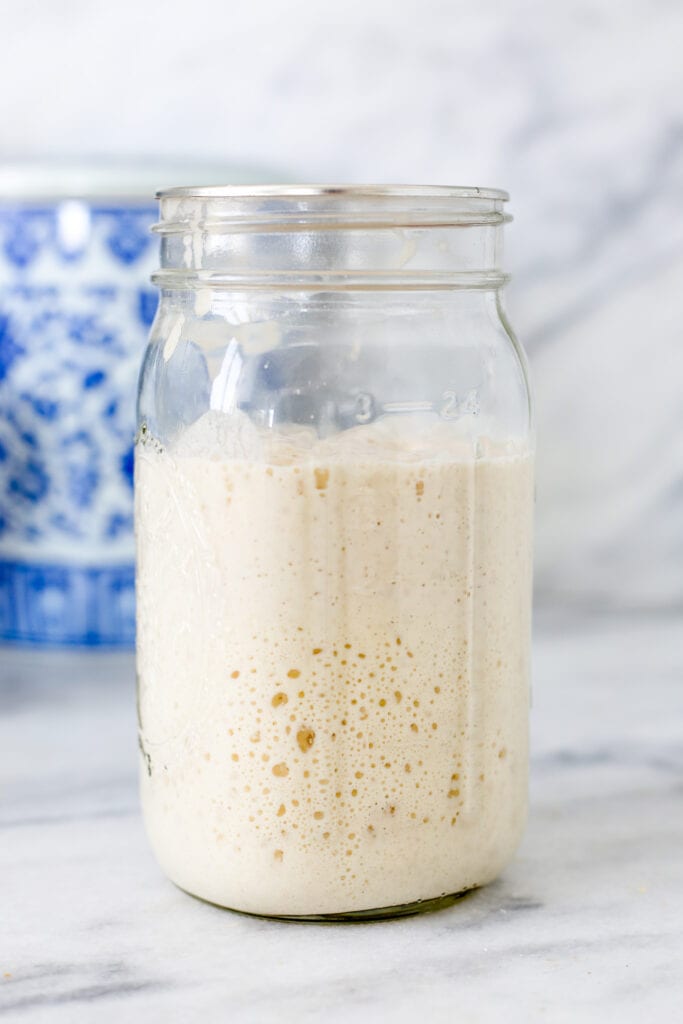
The starter is the foundation of a good sourdough and all you need to make your own is flour and water! It’s like Christmas came early with Nature’s greatest gift to the baker!
There are going to be a lot of words in this post. Brace yourself.
If you would rather just watch the highlight reel, see video in the recipe below.
Let’s Dish Details:
Choosing your flour: I start my levain with rye flour because whole grain flours like rye or whole wheat are less processed than AP, so there is more natural yeast in the flour. This gives the starter a kick-start. Then I switch to AP flour on Day 4 because rye flour has a very specific flavor and I don’t want all of my bread to taste like fermented rye. If I want that flavor, I’ll add rye flour to my bread. Think of it like creating a neutral sourdough base. All the sourness without the specifics.
If you like your levains like your women; low maintenance: You can put her in the refrigerator and only feed her every other week or even in the freezer and feed her every other month! Don’t forget that in order for her to properly feast and grow, she needs to be at room temperature! Take her out of the fridge or freezer, let her sit at room temperature 8-12 hours, feed her as usual and then let her ferment at room temperature over night.
This is so key that I’m going to give it its own line: Sourdough starter needs to ferment AT ROOM TEMPERATURE.
What to do when you want to make bread with your starter. Ah yes, this is the root of the matter. If your starter has been at room temperature, feed it 12-18 hours before you plan to mix your dough. If it has been in the refrigerator, you need 1 day to warm up and then 2 feedings. I like to give my starter a kickstart before I use her by feeding her two times before using it, but you don’t have to. You could let her sit out at room temperature day 1 then feed her that night and then mix your dough the next morning.
Enough chit chat, I’m ready to bake some sourdough! Awesome! Here is my recipe for a basic sourdough bread!
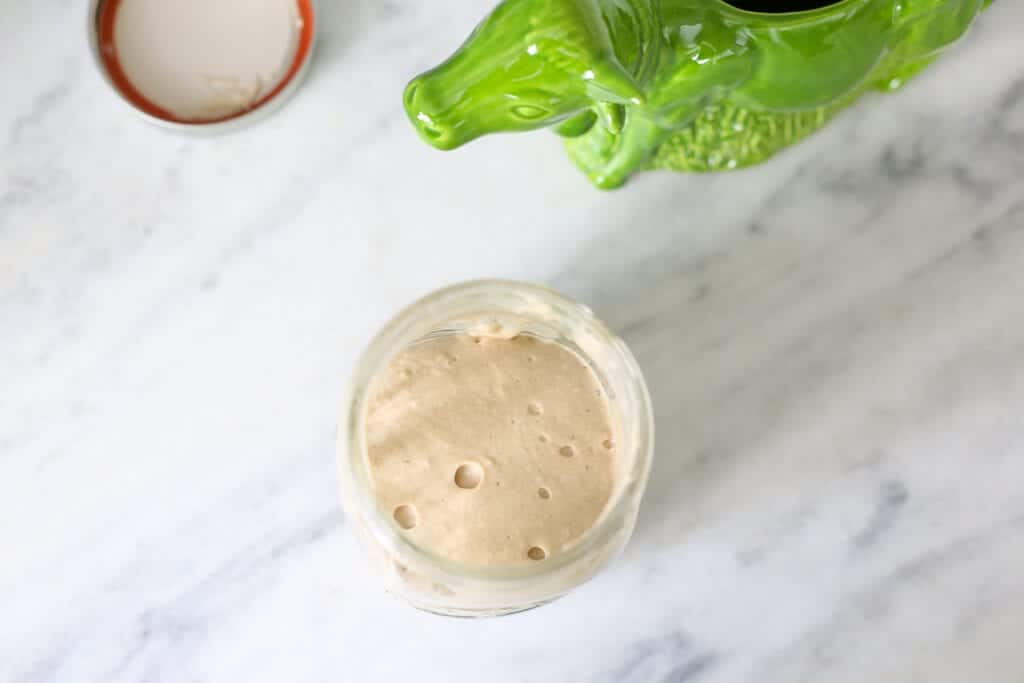
All your sourdough starter questions answered!
Q: It’s been 5 days but my starter didn’t triple like yours did. What’s up?
A: It is probably your flour. Whole grain rye and wheat flours have more natural yeast than all-purpose flour because they are less processed. If you started your levain with AP flour, just be patient. She’ll catch up. Unless you used bleached or bromated AP, in that case she will probably never be strong enough. Those processes don’t leave many yeast, if any, behind. Also check your container. You want it to be clean but not with any soap residue!
Q: This recipe calls for a liquid levain, but what, in God’s green Earth, is a liquid levain and how is that different then a regular starter?
A: The simplified answer is a traditional starter (stiff levain) has equal parts flour and water while a liquid levain has more water than flour. Relax, just feed your traditional starter and whenever a recipe calls for a liquid levain, you can feed a portion of your starter a higher percentage water than flour in preparation or vis versa. The recipe should specify but I use a 125% liquid levain meaning 100g flour + 125g water + 10g old starter
Q: My starter changed color…is that normal?
A: Oooo what color? Part of creating a starter is getting to know it and its many shades. When you first start it, if you use a rye flour, it will be brownish-red to grey. This all depends on the type of rye flour you use! Then when you start to feed it all-purpose it will slowly turn a medium-cream color much like how I envision the color of my second wedding dress. But I digress. The exact color also depends on how processed your AP flour is. When I switched from Pillsbury to King Arthur’s mine took on a brown-speckled cream color. Totally normal.
BUT! If your starter is pink, that is mold and you should throw it directly in the garbage. The environment in a starter isn’t conducive to mold or bacteria growth, but if you use a contaminated container or utensil, you could contaminate your starter. Sadness. This is the end of the road. There is no such thing as a Pretty in Pink Starter.
Q: I think I killed it. Like it’s next level, layer-of-black-liquid-on-top dead.
A: Breathe. You probably didn’t. Most sourdough levains can be revived. Here are some common causes of *almost* death:
Did you neglect it? For shame! Just kidding, this happens to the best of us. Just leave it out at room temperature for 8 hours and then resume feeding it. The longer she has been neglected, the more consecutive days I will feed her before putting her back in the refrigerator. Two weeks? I’ll feed her two nights in a row. Two months? At least 5 consecutive days of feeding or until she doubles in 12 hours. Also, consider putting her in the freezer so you don’t have to have a panic attack every 2 weeks!
She is just so slow, she won’t ever fully double. Just sad, little bubbles on her best day.
This could be because you aren’t throwing away enough of your old starter and you’ve created an environment with too much alcohol for the yeast to proliferate and eat. This is one of the reasons that I feed in a specific ratio. This could also be because you aren’t letting her ferment at room temperature. If you just take your starter out of the fridge, feed it and shove it back in; you can’t expect the yeast to be able to metabolize much starch.
Think of a starter in the refrigerator like a bear in hibernation: its metabolism slows, it doesn’t eat much (or anything) and it just exists. Yeast are similar. The cold slows their activity so they don’t need as much food as often, but if you don’t let the yeast warm up and have a room temperature party, then your starter is going to be a lethargic specimen. Gasp! It me! No stress, let it warm up, feed it, then let it ferment 12 hours before throwing her back into hibernation.
So you decided to experiment with new flours…If your starter was fine and then you got a little cray with the experimentation, then it’s possible that the starch in your flour isn’t as readily available to the yeast, which will slow them down or eventually starve them. Just switch back to AP. Problem solved.
Q: I feed her just like you said and all I see in the morning are bubbles inside the starter but she isn’t any higher. What gives?
A: It is possible that she *gasp* already doubled and has fallen by the time you get up! She is like my cat at night – she runs around like a crazed animal but then when I get up in the morning she is already fast asleep in the window soaking up the sun. You missed the action! There are some tell-tale signs that your starter already had a party: there are lots of little bubbles inside the starter; you can see a ring around the container stopping at a particular height; there are streaks leading down from that ring. Think of these streaks like “legs” in a glass of nice wine. You know when you swirl it and then the wine runs down the glass in separate streams? Those legs are created by the alcohol in the wine and a similar situation is happening in your starter container.
I always scrape down the sides of my container after mixing so I can easily spot if my starter rose and fell. This information is also crucial if you are going to make bread. You need to know how long it takes for her to double so she can hit that high note at the exact time you want to mix your dough. The kitchen is her oyster, you are just living in it .
Q: Ahhh I get it! She’s fast like a lambo. But I want to make bread at 9AM and she is doubling in 6 hours. I am NOT getting up at 3AM to feed her! I don’t care if the world is her oyster!
A: Come in close, I’m going to let you in on a little secret. The kitchen may be her oyster but you own the kitchen. You need to adjust her world so that she grows at the rate you want her to. What temperature is your kitchen? Maybe its warm and conducive to rapid growth. Cool her down. If you don’t have a colder part of your house, put her in a pot full of ice water over night. How much starter are you using? Are you eye-balling it? Well you can control that. Weigh it and stick to the 10% of the flour by weight.
Q: Why do I have to weigh my starter to feed it? Like, this isn’t science.
A: Yo, sassy. It is science. Volume measurements of the flour and water are one thing: Important but if measured properly, can be controlled. However, the volume of your starter changes by minute. 1 tablespoon after 8 hours is completely different than 1 tablespoon after 17 hours. You could be inadvertently be adding triple the amount of yeast culture one day and then barely any the next. Invest in a kitchen scale.
Q: Did you accidentally heat her up? Umm how hot? (Also, wtf were you doing?!)
A: Hotter than 140°F? She’s probably dead. Woops!
Q: What is the benefit to having an old starter? Why not just make a new one if I have time?
A: I have a question back at you—who the heck has time for that?! But in all seriousness, sourdough starters mature with age like a fine wine. The aroma and flavor will deepen and strengthen along with the potency of your yeast as long as you feed it regularly. Depending on the flours you use and your environment, the starter will take on its own unique flavor. A sourdough taste that is all yours!
Q: Do I have to throw all the old starter away?! It seem so wasteful.
A: It totally is wasteful, but it’s in the name of naturally leavened bread, so worth it IMO. You don’t have to throw it away. There are plenty of recipes that use old starter for the sourdough flavor minus the leavening.
Alternatively, you could maintain a smaller starter and then bulk it up when you want to make bread. As long as you keep the ratios of flour to water to culture the same, then its all good. Keep in mind that when you feed it to use it, you need to have extra in order to make the next day’s levain. So add 10% waste or 15% if you are stressed. All I mean by that is add an extra 10% on top of each of the measurements, for example, if the recipe calls for 200g flour in your levain you will use 220g. Make sure you increase ALL the measurements. Ha! Your 5th grade teacher was right – math is useful!
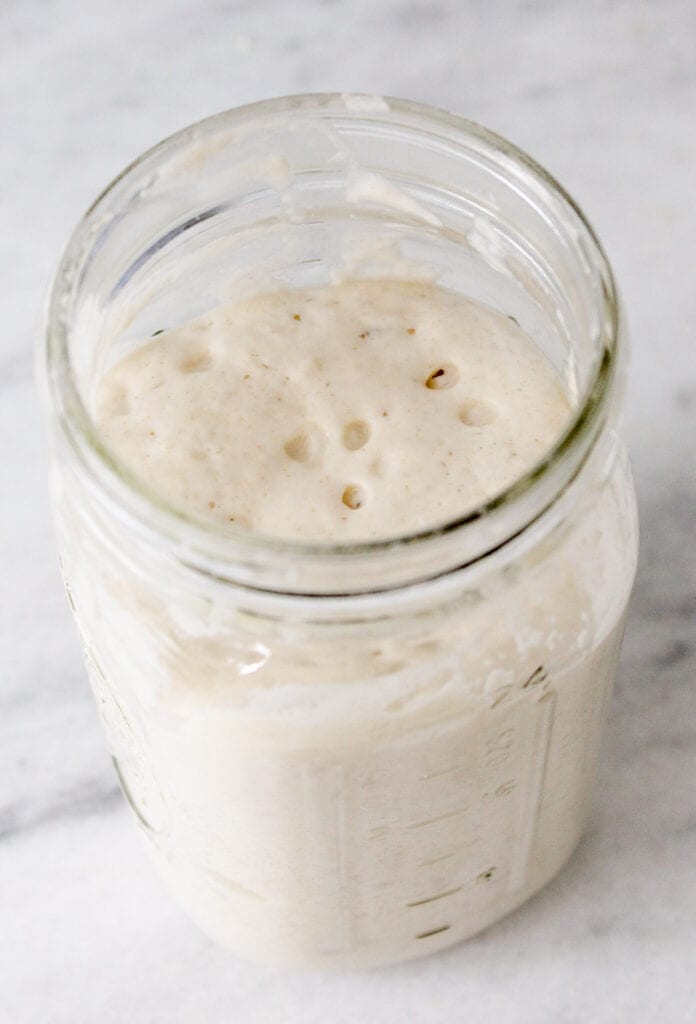
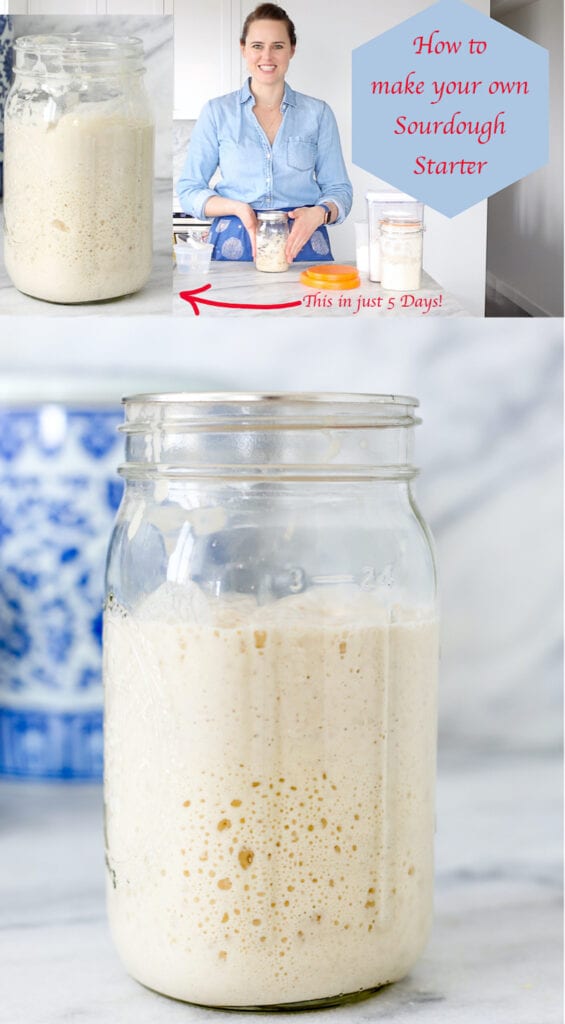
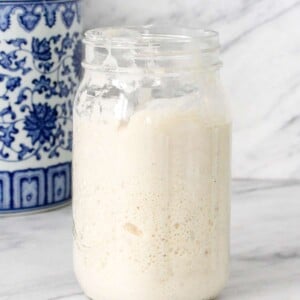
Sourdough Starter Recipe
Ingredients
- 300 g rye flour
- 700 g water
- 400 g all-purpose flour
Instructions
Day 1:
- Combine 100g rye flour and 100g water in a clean container, cover, let sit out 24 hours at room temperature
Day 2:
- In a clean container combine 100g rye flour, 100g water, and 100g yesterday’s starter. Throw out the remaining starter. Cover and let sit out at room temperature 24 hours. You should start seeing bubbles and some activity.
Day 3:
- Repeat Day 2. Your starter should just about double or more!
Day 4:
- Combine 100g all-purpose flour, 100g water, and 100g yesterday’s starter. Throw out the remaining starter. Cover and let sit out at room temperature 24 hours. The starter will definitely double and have larger air pockets.
Day 5:
- Repeat Day 4. Mine had tripled by this point. You can totally use her to leaven bread!
Day 6 & 7:
- Repeat Day 4.
- Feeding your starter for the long term: You want a controlled growth of your starter when you are going to use it for bread. This is all in the feeding. Once you have an active starter you can switch to the following ratio for a stiff levain:
- 100g water
- 10g previous day’s starter
- 100g AP flour
- Or this one for a Liquid Levain:
- 125g Water
- 10 g Previous day’s starter
- 100g AP Flour
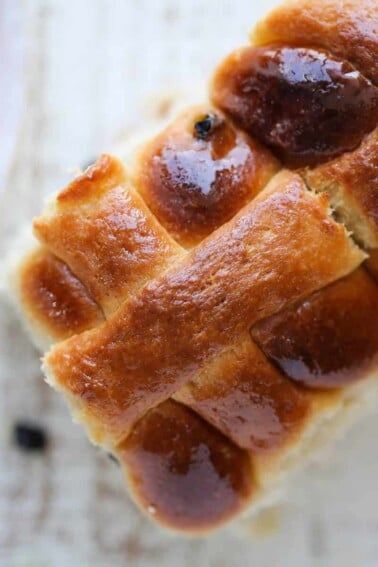

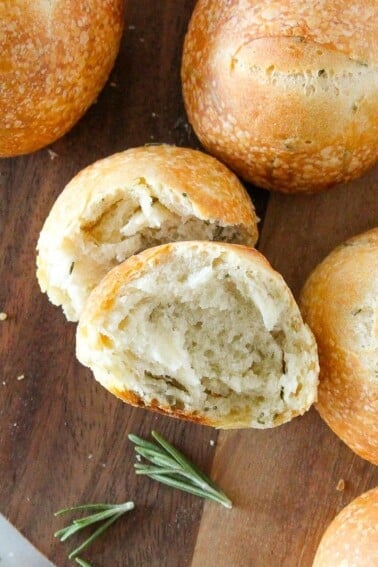
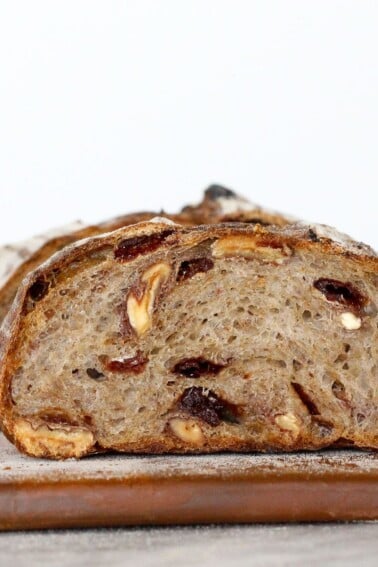








Loved this guide Lindsey, really easy to follow and Im going to give it a try at the weekend. Will share pics. thanks and ove the blog.
Thanks! Good luck, Pauline!
thank you for your post! On recipe, I tried it and it is delicious thank you so much!
I’m glad, Ched
Only 9 hours I refreshed mine, today Day 2, and it has already tripled. Beautiful thing!
Check you out!!! Nicely done!
I really love these, Thanks for the recipe.
I really love to try this.
So sorry I didn’t see this sooner! I will get right on it!! Thanks so much!!
Easiest recipe on my site 😉 Good to hear from you!
Thanks for this informative post!
So, you don’t remove some of the starter as you’re building it? You just keep adding more and more to your jar? I’d better get a much larger jar.
No so you are weighing a specific amount of the starter each time. I go back and forth between two jars to make it easier. During the creation process you are using 100g of your old starter plus more flour and water. Then during the maintenance process you use just 10 g of your old starter. I hope that clarifies. I am going to re-write some of the instructions to make that more clear!
Excellent guide here, Lindsey! We’ve been baking all sorts of breads here, and sourdoughs have been some of the more popular. Robbie has been enjoying helping making the dough each day…and then helping eat said bread with jam later in the day. (Heck, it’s given us something to do lately!) Hopefully my starter doesn’t kick the bucket, but if it does then I’m coming back here to your guide! Also, “If you like your levains like your women; low maintenance”…HAH!
I am sure your starter won’t kick the bucket! It sounds like you and Robbie are busy bees in the kitchen! There is nothing better than fresh bread with butter and jam! Love!